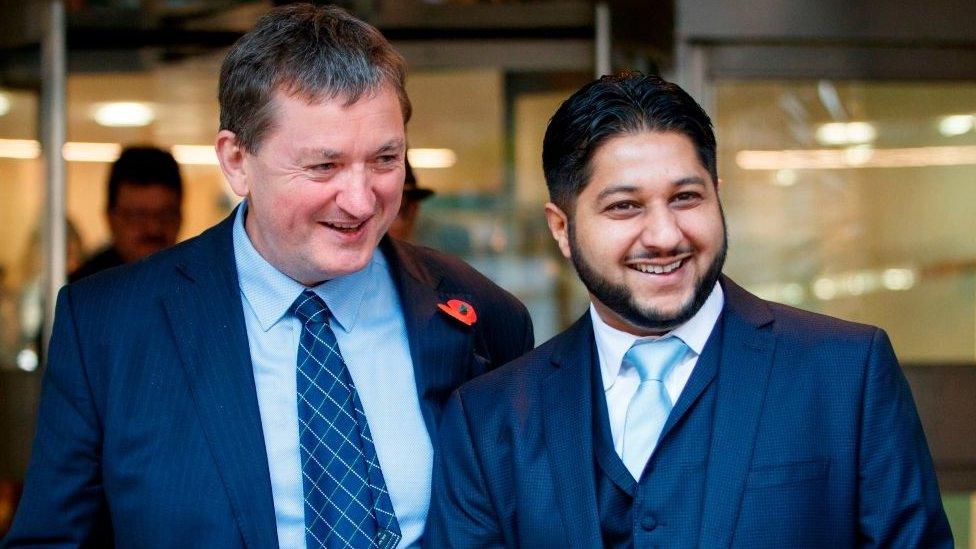Uber loses latest legal bid over driver rights
- Published

The case centres around former Uber drivers James Farrar (left) and Yaseen Aslam
Uber has lost an appeal against a ruling that its drivers should be treated as workers rather than self-employed.
In 2016 a tribunal ruled drivers James Farrar and Yaseen Aslam were Uber staff and entitled to holiday pay, paid rest breaks and the minimum wage.
That ruling has now been upheld by the Court of Appeal.
But Uber pointed out that one of the three judges backed its case and said it would appeal to the Supreme Court.
Mr Farrar, who is chairman of the United Private Hire Drivers branch of the IWGB union, said: "I am delighted today's ruling brings us closer to the ending Uber's abuse of precarious workers made possible by tactics of contract trickery, psychological manipulation and old-fashioned bullying."
He added that he was dismayed that implementation of worker status for drivers was being further delayed while Uber seeks yet another appeal.
'A cynical ploy'
"This is nothing more than a cynical ploy to delay inevitable changes to its business model while it pursues a record breaking $120bn stock market flotation," Mr Farrar said.
"It's time for Uber to come clean with all its stakeholders and abide by the decision of the courts."
The GMB union said that Uber should "just accept the verdict", after losing three times in a row.
Prior to this, the Employment Tribunal ruled in November 2017 that it was upholding its original decision.
Uber drivers on strike in London in October demanding employment rights, an end to unfair dismissals, a rise in fares and a reduction of commission
"This is the perfect early Christmas present for GMB's Uber members, but this case is about the wider 'gig economy' too," said the GMB's general secretary Tim Roache.
"Employers are on notice that they can't just run rough shod over working people to put more on the bottom line for shareholders."
Not unanimous
Uber has been granted permission to appeal to the Supreme Court.
The firm said it was encouraged that one of the appeal judges said that Uber's argument was "neither unrealistic nor artificial", but in accordance with a well-recognised business model in the private hire car industry.
"Almost all taxi and private hire drivers have been self-employed for decades, long before our app existed," an Uber spokesperson said.
"Drivers who use the Uber app make more than the London Living Wage and want to keep the freedom to choose if, when and where they drive.
"If drivers were classified as workers they would inevitably lose some of the freedom and flexibility that comes with being their own boss."
However, law firm Gowling WLG expects the Supreme Court to uphold the decision.
"Yet another court confirms that the more a brand seeks to control the activities of the people that deliver that brand's services to the public, the less likely those people are to be self-employed," said Jonathan Chamberlain, partner at Gowling.
"The law will probably always remain uncertain in this area, despite the governments promise of reform, but the direction of travel is clear. I expect the Supreme Court to uphold this judgement, but we shall see."